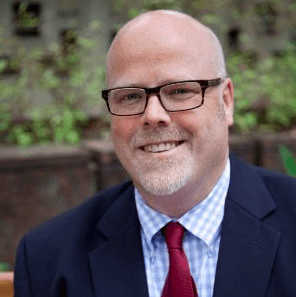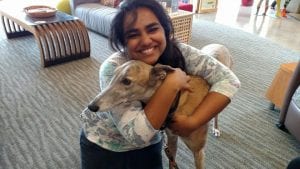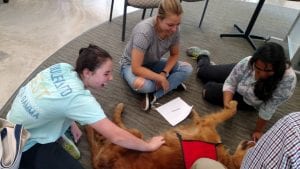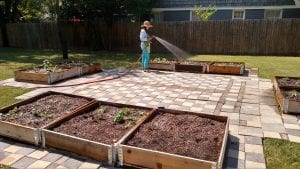The challenge was to prototype a sustainable, low-cost, mobile greenhouse. Most importantly, we wanted to value energy independence, water conservation, and space efficiency to grow plants. Using funds raised from the Greenhouse for Good Giving Day, our team meet the challenge with a plan!
The proposed design must be environmentally friendly, economically viable, and address social issues.
Our creative team came up with a concept: an educational, mobile greenhouse made from a reclaimed travel trailer. The versatile growing space could be used to support school gardens and the teachers who run them.
Why a travel trailer?
We needed something mobile. RVs come with truck chassis, electrical wiring, four walls, door, roof, kitchen sink, and water tank. If we could retrofit a discarded one, theoretically, we could convert it to a road-worthy mobile greenhouse that could be hooked up to a truck. This was preferable to other temporary alternatives, like a shipping container, as our target audience was more likely to have access to a truck than a fork lift.
Trailers are compact and use less space than what urban farms typically require. A small-space alternative appealed to individuals and neighborhoods who do not have access to a vacant plot or parking lot. A trailer would only require a driveway or parking space to be viable for growth production.
In our preliminary research, we did not find mobile greenhouses. We did find a truck converted into a teaching trailer, but only twelve days before completing our project. Though we couldn’t incorporate that research, it was exciting to have our idea validated.
Most “mobile” gardens are raised beds that require a fork lift, or other equipment, to move. They are more portable than mobile. We found some good examples close to home (check out what our friends at Big Tex Urban Farms use in the images below). Ultimately, we hoped for something that could be moved with (relative) ease. This brought us to our little trailer.
One of the benefits of working with an interdisciplinary, multi-generational and cross-cultural team is that the challenge was considered holistically. In one of our first brainstorms, emerging questions included:
- In extreme climates or post-disaster zones, how do we regulate food production?
- Can our military take their garden with them wherever they go?
- How can refugee camps or other temporary settlements access fresh produce?
- Could a greenhouse function without a nearby water source or infrastructure to support heating and cooling?
- Can a greenhouse be scaled to an entrepreneur who rents their home or lives in an urban slum?
These questions gave us a picture of all the new applications that were still to come.








 Chad Houser is the Executive Director and Chef at Café Momentum – a restaurant and culinary training program for juvenile offenders at Dallas County Youth Village. Café Momentum is a regionally recognized restaurant (Top Dallas Restaurant in 2016) and a national recognized organization that provides a transformative experience for its interns. Through a 12-month paid post-release internship program
Chad Houser is the Executive Director and Chef at Café Momentum – a restaurant and culinary training program for juvenile offenders at Dallas County Youth Village. Café Momentum is a regionally recognized restaurant (Top Dallas Restaurant in 2016) and a national recognized organization that provides a transformative experience for its interns. Through a 12-month paid post-release internship program Ryan Eason is the Manager of Community Relations and Strategic communications for Medical City Healthcare. Ryan created the program Kids Teaching Kids to educate students about healthy eating habits. Local high school culinary students create healthy recipes for elementary students, while encouraging them to make their own healthier treats during a 21 day challenge. Finally, these high school culinary students create healthy kids menus (like mac and cheese with pureed squash) that can be offered in restaurants. The program has brought a healthier lifestyle to tens of thousands of school children in north Texas. Ryan created the program four years ago, and it continues to grow each year thanks to his dedication and creativity.
Ryan Eason is the Manager of Community Relations and Strategic communications for Medical City Healthcare. Ryan created the program Kids Teaching Kids to educate students about healthy eating habits. Local high school culinary students create healthy recipes for elementary students, while encouraging them to make their own healthier treats during a 21 day challenge. Finally, these high school culinary students create healthy kids menus (like mac and cheese with pureed squash) that can be offered in restaurants. The program has brought a healthier lifestyle to tens of thousands of school children in north Texas. Ryan created the program four years ago, and it continues to grow each year thanks to his dedication and creativity.  Owen Hanley Lynch is an Associate Professor of Communication at SMU, and the Senior Research Fellow for the Hunt Institute for Engineering & Humanity in the Lyle School Engineering. Dr. Lynch is also the Executive Director of Get Healthy Dallas, a nonprofit organization dedicated to addressing the lack of healthy food options, adequate education, and economic development opportunities in South Dallas. In November 2017
Owen Hanley Lynch is an Associate Professor of Communication at SMU, and the Senior Research Fellow for the Hunt Institute for Engineering & Humanity in the Lyle School Engineering. Dr. Lynch is also the Executive Director of Get Healthy Dallas, a nonprofit organization dedicated to addressing the lack of healthy food options, adequate education, and economic development opportunities in South Dallas. In November 2017 Jennifer Eyer leads the Food in Schools Initiative for Children at Risk. Part of the Food in Schools program is the Universal School Breakfast throughout Dallas Independent School District. Universal School Breakfast dramatically improves access to healthy food for children, while increasing their attentiveness and classroom performance. This program is coupled with an extensive outreach programming to educate other school districts across the state on strategies to implement universal school breakfast programs and to increase participation of schools. Children at Risk also educates and performs outreach on summer meal programs and
Jennifer Eyer leads the Food in Schools Initiative for Children at Risk. Part of the Food in Schools program is the Universal School Breakfast throughout Dallas Independent School District. Universal School Breakfast dramatically improves access to healthy food for children, while increasing their attentiveness and classroom performance. This program is coupled with an extensive outreach programming to educate other school districts across the state on strategies to implement universal school breakfast programs and to increase participation of schools. Children at Risk also educates and performs outreach on summer meal programs and Drew Demler
Drew Demler








